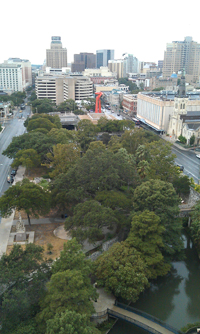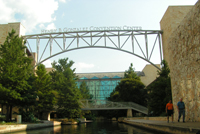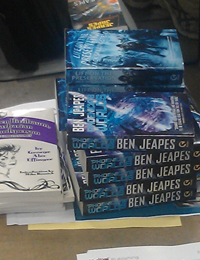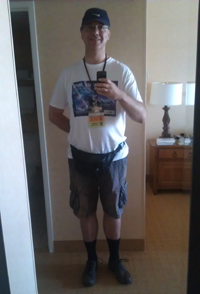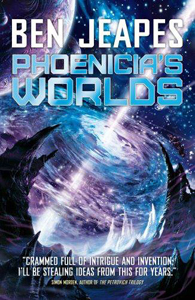Late August/early September saw me in San Antonio, Texas, for LoneStarCon3, a.k.a. Worldcon. Yee-haw!
The main thing to report: I enjoyed myself, and a lot more than I thought I would. I wasn’t expecting to go to Worldcon at all, until I suddenly found I had a book coming out in August. Ah well, if a week in Texas for a bit of self-promotion seems the best thing then who am I to argue?
San Antonio: a lovely town centre, though I can’t speak for the outskirts. Beyond the limits of a 30 minute casual stroll it might be a gang-raddled urban wasteland, though I’m guessing not. The nights were singularly unpunctuated by wailing sirens and gunshots; the loudest thing was the mournful cry of a passing goods train, which is such a delightfully American sound.
For starters, it has the Alamo, and it has the River Walk. The Alamo was smaller than expected, which shouldn’t really have been much of a surprise: most it consisted of empty space inside a large perimeter wall. and that space is now the plaza in front of it. The image that everyone recognises is the church inside the Alamo, where the few survivors (women, children and slaves; there was chivalry, of a sort) were able to huddle in the sacristy. I got to watch the History Channel presentation of what happened and felt like saluting.
The River Walk is a wonderful example of life handing you lemons and making gin and tonic. Major floods back in the 1920s led the city fathers to cut a drainage channel for the river. They could have paved over it and kept it as a storm sewer. But no, they decided to landscape it, plant it with trees and bushes, and create a shady network of walkways beneath street level that will get you to most places in the city centre. As well as being a handy means of pedestrian access, it’s lined with restaurants (and predatory pigeons that come and land on your table if you don’t get firm with them) and stalls of various kinds. Without it, San Antonio would just be a hot and dusty Texas town. With it, it’s something else altogether. Granted it’s a little like an overgrown Center Parcs and will never fool anyone into thinking it’s natural, but so what. It’s lovely.
So, Worldcon.
The venue: very nice. The Henry B. Gonzales Conference Centre is neither too big nor too small. Small enough that you can easily find people to bump into, large enough that the dealers room and associated exhibitions provided all the entertainment you could ask for. I never got bored or lonely, and that is all too easy to do at a Worldcon. I like time to myself and I like time with other people, all in the correct proportions – and I absolutely hate making friends from scratch in a crowd of strangers.
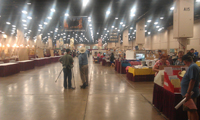 As it was, I was able to meet up with enough old friends at key points along the Worldcon timeline, by design or by accident, to be content, and I made some new ones via personal introduction. All good. It was also cleverly designed to incorporate a spur of the River Walk, and blur the distinction between its indoor and outdoor space – not that there’s much danger of anyone getting confused with the difference in temperature: muggy heat outside, ice-cold aircon within.
As it was, I was able to meet up with enough old friends at key points along the Worldcon timeline, by design or by accident, to be content, and I made some new ones via personal introduction. All good. It was also cleverly designed to incorporate a spur of the River Walk, and blur the distinction between its indoor and outdoor space – not that there’s much danger of anyone getting confused with the difference in temperature: muggy heat outside, ice-cold aircon within.
The dealers room was a good size and I got to see one of my books on sale in North America, for the first time ever in my 15 years as a published novelist! All the previous have been available, but what with not being with specialist publishers have never found their way into the dealers room. But here these were, on at least three different vendors’ stands. How nice to be with a publisher that actually has a clue about these things. Needless to say, not one that I saw went unsigned.
And the programme … yes, the programme. Maybe it’s the law of averages, maybe I’m getting old, maybe it’s actually a sign of Worldcon’s success in covering a wide range of topics that represent the whole of the vastness that is fandom … but the programme didn’t enthral me. Not that it was bad, and I’m certainly not denigrating the astonishing effort by the army of amazing volunteers who put and hold it all together. But I can say that at previous Worldcons it hasn’t been hard to find enough concurrent items that I could cheerfully spend a whole morning or afternoon in one panel or another. This one – not so much.
But it was still good.
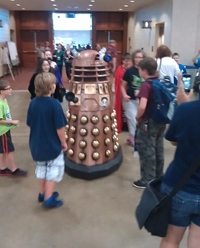 Most personally profitable item: the panel on self-promotion. I feel vindicated after hearing Teresa Nielsen Hayden say in public that if you’re one of those authors who would rather be boiled in oil than engage your fans in social media, fine – just be an author and write. A buoyant social media community is a joy to behold but there’s no point faking one. People can tell and it doesn’t work. Find what does.
Most personally profitable item: the panel on self-promotion. I feel vindicated after hearing Teresa Nielsen Hayden say in public that if you’re one of those authors who would rather be boiled in oil than engage your fans in social media, fine – just be an author and write. A buoyant social media community is a joy to behold but there’s no point faking one. People can tell and it doesn’t work. Find what does.
Most pride-making item: Solaris presents – mighty editor Jonathan Oliver showing off his new acquisitions, i.e. YT and sundry others, to an adoring public. Well, we filled a few seats.
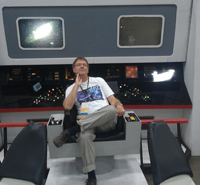
The starboard bow, you say? But surely, in space navigation, we utilise a three-dimensional frame of reference, making such traditional two-dimensional terms obsolete? Oh, okay, sorry – fire torpedoes!
Most useful item: Lou Anders’ one-hour workshop on bringing screenplay skills to novel writing. A piece of advice I may actually cherish was: “Don’t watch movies for the story – watch them for the writers.” On that basis, I might actually make myself watch The Avengers. One of Lou’s many helpful tools was, if I remember right, the Fairly Useful Octagon of characters, which as best I can recall goes: protagonist, antagonist, mentor, bad example, believer, doubter, thinker, feeler. Or, as you might say and to use Lou’s example: Luke, Tarkin, Obi-Wan, Darth, R2D2, C3PO, Leia, Han.
Most enjoyable item: the one I was on, which was also the most moving one. This was Kim Stanley Robinson, Alastair Reynolds, Vince Doherty and YT discussing the legacy of Iain M. Banks. I was honoured to be a last-minute replacement for Pat Cadigan, who was double-booked. Al shared this whisky-related anecdote, which was quite sweet, and gives his own recollections here. I will correct him on one thing – I did meet Iain, once. Would have liked it to be more.
As for the self-promotion thing – the bit that made me go in the first place – well, no idea how well that went. I had t-shirts, one for each day, with the cover of Phoenicia’s Worlds on the front and the nice remarks by Simon Morden and Gareth L. Powell on the back. I have to say it’s quite nice not to be wearing them everyday anymore, though I did think of putting them unwashed on eBay so that dedicated fans can clone me.
(I blame the t-shirts – at least partly – on the cold I brought back with me. Americans generally have their aircon turned down way too low, and going from baking hot outside to shivering inside several times a day can’t be good for you. Native USians and others in the know wisely layer up; sad Brits like me go mad in the heat and wear as little as possible, so the air conditioning hits you twice as hard.)
And then I came home, and rather to my surprise started reading reports which suggest other people hadn’t enjoyed it quite so much, for a variety of reasons, not one of which had ever occurred to me. And that requires a separate post.


